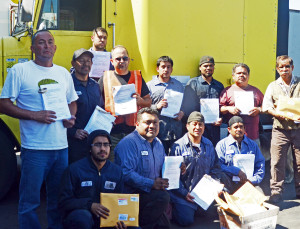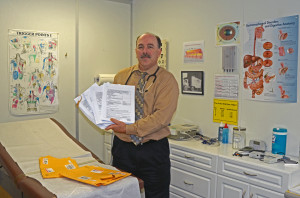A Helping Hand or an Axe for Army Base?
Aug 23, 2013
Posted in Army Base Jobs, Environment
“We’ve (already) started seeing trucks returning to West Oakland neighborhoods,” said Councilmember Lynette McElhaney
By Ken A. Epstein
“Nobody knows what’s going to happen. The anxiety level is high. This is no way to run a business.”
That is the way Bill Aboudi of Oakland Maritime Support Services (OMSS) sums up how he and others are feeling as they await the fate of their jobs and businesses at the city’s old Army Base property.
On one hand, city staff is working feverishly to help them move to an alternative site on city land at the North Gateway of the Army Base, located by the East Bay Municipal Utility District plant.
Assistant City Administrator Fred Blackwell and Councilmember Lynette Gibson McElhaney are working to make the move happen, as is the master developer of the base project, Phil Tagami of CCIG.
On the other hand, the workers and business people would not be surprised to be met in the next few weeks by sheriffs ready to throw them into the street.

The city already has sent out evictions notices to 18 small businesses and hundreds of independent truckers who are based at OMSS. They could be evicted by Alameda County Sheriffs by Sept. 3,when the city plans to clear the property to start its long awaited Army Base development project.
Officials involved in the project have failed to return repeated calls and emails from the Post asking about what they are doing to save the jobs and businesses.
Tagami’s office referred the Post’s questions to the city. Neither Mayor Jean Quan, Assistant City Administrator Blackwell or the City Administrator’s Office returned requests for interviews.
“I continue to be positive that something will be worked out, “said McElhaney in an interview Thursday.

“In the past few months, we’ve started seeing trucks returning to West Oakland neighborhoods in part due to the uncertainly about what will happen to the Army Base,” she said.
With the increase of trucks on the streets, “We are seeing human excrement and public urination in the neighborhoods again,” said McElhaney.
The city is trying to find an alternative place for OMSS after Port officials and the Port Commission blocked the temporary move of OMSS to its land, despite an initial agreement worked out with the city, according to McElhaney.
The port claims that it has the capacity to provide all the truck parking and support services that are presently offered by OMSS.
What the port is doing is “absolutely leading to the harm of West Oakland residents,” McElhaney said. “City staff has told us there is no alternative to truck parking and the trucking services that OMSS provides.”
When the council member attempted to discuss the need to support OMSS before the Port Commission made a decision, commissioners did not return her calls, McElhaney said.
While the city is trying now to find a home for OMSS, it has ignored for many years the need to develop ways to support trucking and minimize the environmental impacts of the big rigs on which the port depends, according to the West Oakland Environmental Indicators Project (WOEIP) and other community groups.
Only last month, the city finally agreed it will develop a plan to deal with the trucking, sometime in the next two years.
“The city and the port have not made arrangements to handle truck parking and trucking services. We can demonstrate that the city ‘s inaction, lack of planning, has caused trucks to move back into West Oakland,” said Brian Beveridge of WOEIP.
“It means that this project increases negative impacts on the community, which jeopardizes federal funding,” he said.
Dr. Randy Hicks operates one of the small businesses at OMSS where for the past 10 years he has been running a medical office six days a week. His office does physicals and the drug and urine testing required of drivers by the federal Department of Transportation.
“We have received four different eviction notices since Monday,” said Hicks. “My employees are freaking out. They don’t know if they are going to have a job, if they need to start looking.”
He said he believes his practice is the only one that serves truckers in Oakland though there are a couple in Hayward. He says he does about 50 or 60 drug tests a week and the same number of physicals.
“The drivers can come here on their lunch breaks. They can just do their physicals and get back to work,” said Aboudi. In the past they used to go to a doctor’s office in Jack London Square, which would cause them to lose about a half day of work, he said.
“I ask the city, ‘What do I tell the people here at the base?’ They say, ‘Tell them they have to move,” Aboudi said. “I ask them, ‘Where are they going to move?’ They say, ‘We’re working on that.’”